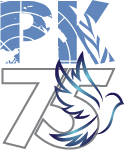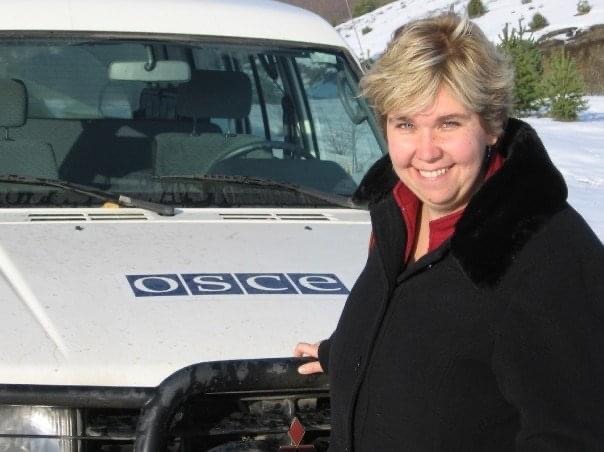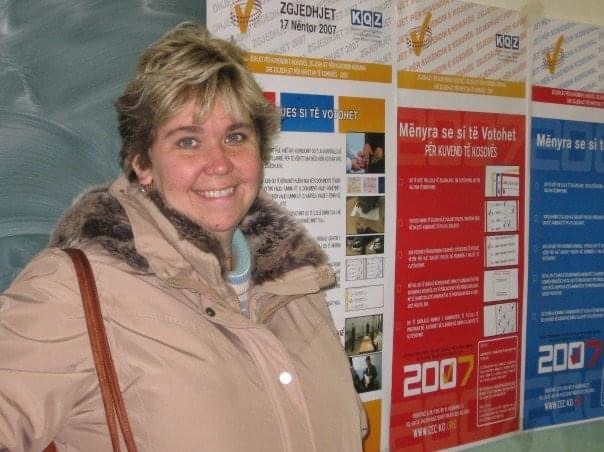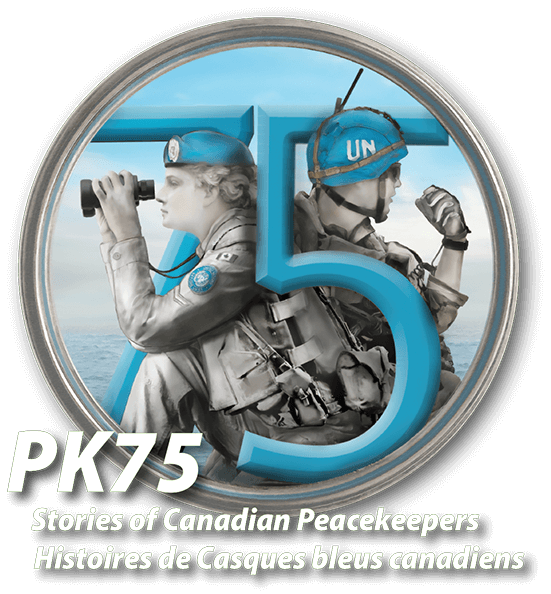

I was in Pristina, Kosovo on February 17, 2008. This was the day that the Assembly of Kosovo declared independence. People had waited a long time for that day, through the ethnic cleansing and horrors of war in 1998/99, the NATO operation and bombing that ended the war, and then many years under executive authority of a UN Peacekeeping Mission (United Nations Mission in Kosovo, or UNMIK), Kosovars held on to the hope of someday being a free and sovereign country.
I was working with the OSCE Mission in Kosovo which was considered part of UNMIK, making us civilian peacekeepers. We carried no weapons, wore no body armour and we were not in any military force. Our security depended on the NATO-led Kosovo Force (KFOR) troops present, but our jobs were to help establish democratic institutions and rebuild the country for a sustainable peace. We did not live on a military base but in apartments in the city where, every day, we interacted with the local population, who became friends and colleagues.
I sometimes wish that Canadian Armed Forces members who participated in the war in Kosovo could have seen what I saw on Independence Day. People were out in the streets all day and late into the night, on one of the coldest nights of the year, cheering and dancing and singing and crying and thanking us. Calling out “Gezuar Pavarsine” meaning Happy Independence. If you were from a NATO country, including Canada, the people would clasp our hands in theirs and thank us, trying to give us gifts. My American neighbour had someone try to give him his bicycle. The level of gratitude and emotion is something I will never forget.
One image is forever etched in my memory — that of an old man, tears streaming down his aged and wrinkled face, holding the hand of his five-year-old grandson, telling him “now you will be free”. Old and young alike were out in the streets that day, holding red Albanian flags (the Kosovo flag was not yet created), colourful signs, many of them with American, British, or Canadian flags on them, and setting off explosives. People had waited years, collecting anything that could go boom, to set them off on Independence Day.
We were warned by UNMIK to be careful of “happy shooting” — people shooting into the air in celebration, which also happened during weddings and sporting events. My office was on the seventh floor of the OSCE building and my Kosovar colleagues wisely advised that it was better to be on the street beside the person shooting than up high. We went through the streets, all the way to the NEWBORN statue that was in front of the stadium, which people were climbing on and signing. When we got home, we could see and hear the celebrations from our balcony, until tracer fire started to come from the building beside us and we decided indoors was safer.
My parents are from the Netherlands, and I grew up hearing stories about the Dutch liberation. My father got his first candy from a Canadian soldier when he was five years old. But I don’t think I truly understood the depth of emotion of a newly liberated country until that night in Kosovo. An entire country full of hope, relief, joy. A communal exhaling of held breath. A giddiness that comes from the lifting of the weight of tears unshed for years for all that was lost, and giving themselves permission to finally dream about a future they didn’t dare think would ever happen.
There are moments in life where it doesn’t matter who you are, what has happened in the past or what might happen in the future. Moments of shared feeling and emotion that stay with you forever. That was Pristina on that cold winter night in February 15 years ago. I am fortunate to have been a witness to it.
Biography
Anita Vandenbeld has been committed to democracy promotion and to the women, peace, and security agenda throughout her career, whether as a Member of Parliament or prior to that in working with multinational institutions like the Organization for Security and Cooperation in Europe (OSCE), the United Nations Development Program (UNDP), and UN Women, or with international democracy NGOs like the National Democratic Institute (NDI) and the Parliamentary Centre.
Anita studied constitutional and political history at the University of Calgary (BA 1995) and York University (MA 1996). Being from Calgary, after graduation she found work in the oil and gas industry with a mergers and acquisitions firm. But this was not what she wanted to do with her life and, in June 2000, she had an opportunity to go to Bosnia and Herzegovina (BiH) as a Junior Professional Consultant. She worked as coordinator of an anti-corruption campaign with the OSCE Mission in BiH. Working in a post-conflict zone where her safety and security depended on 20,000 NATO troops, then under Canadian command. That experience was life-altering. Anita had always thought of war as something of her parent’s generation (she is the daughter of Dutch immigrants), but in Bosnia it was her peers who had been on the front lines. She heard first-hand accounts from friends and colleagues of terrible war crimes, sexual violence, and ethnic cleansing. While she was in Bosnia, women from around the world came together to push for the passage of Security Council Resolution 1325 on Women, Peace, and Security (SC1325). Anita was profoundly influenced by this, to the point where, when she was elected to the Canadian House of Commons in 2015, she spoke about SC1325 in her maiden speech in Parliament.
Following several years gaining experience by working in the Canadian Parliament, including as Director of Parliamentary Affairs for the first-ever Minister of Democratic Reform, and also with the Parliamentary Centre, Anita returned to international work in 2007 as senior advisor and deputy chief of the Central Assembly and Political Parties section of the OSCE Mission in Kosovo, which was part of the United Nations Peacekeeping Mission in Kosovo (UNMIK). Anita was in Kosovo during the year that Kosovo declared independence, helping the Assembly of Kosovo to evolve from a rubber-stamp assembly under the Provisional Institutions of Self-Governance of UNMIK, to a National Parliament literally overnight. As a civilian peacekeeper, Anita was awarded the Canadian Peacekeeping Service Medal for her work in Kosovo.
In 2008 Anita moved to Norway and then New York with UNDP to manage a multi-partner, global network promoting women’s political participation (iKNOWPolitics.org), with staff on five continents. In 2010, she left that position to run for Parliament in Canada, running unsuccessfully as the Liberal candidate against then foreign minister John Baird, in 2011. For the next several years, Anita continued her international work, as resident director of NDI in the Democratic Republic of Congo, senior advisor to the Parliament of Bangladesh with UNDP, leading an NDI women’s leadership academy in Haiti, publishing a UNDP report on women’s participation in Vietnam, and more.
In 2015 Anita ran for office again and was elected as the Member of Parliament for Ottawa West-Nepean. She was re-elected in 2019 and again in 2021. Anita has served as Parliamentary Secretary to the Minister of National Defence (2019–2021) and as Parliamentary Secretary to the Minister of International Development (2021 to present). Anita was chair of the Subcommittee on International Human Rights, the Special Committee on Pay Equity, the Parliamentary Women’s Caucus, and is founding chair of the all-party Democracy caucus.
Anita is a contributing author to the ‘Oxford Handbook on Transnational Feminist Movements’ and ‘Turning Parliament Inside Out’. Anita is on the Steering Committee of the World Movement for Democracy, she is a member of the Parliamentary Rapid Response Team of Parliamentarians for Global Action, she is a founding member of the International Parliamentary Network for Education, and she has recently founded the Women Legislators in Defence, Security and Peace portfolios global network. Anita was recognized by Esprit de Corps magazine as one of the Top Women in Defence in 2021. She lives in Ottawa with her spouse Don Dransfield and two cats.

In Kosovo with the OSCE vehicle.

At a polling station during the 2007 elections.


